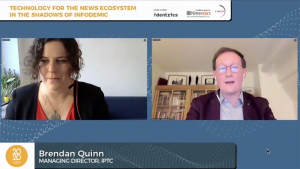Categories
Archives
IPTC Managing Director Brendan Quinn spoke at the FIBEP World Media Intelligence Congress 2020 on Wednesday 18th November.
FIBEP is the industry body for the “media intelligence” industry, including media monitoring, public relations and marketing organisations.
FIBEP was founded over 65 years ago (so it is even older than IPTC!) and the FIBEP World Media Intelligence Congress has become one of the largest events for communications, public relations, technology, social media monitoring and marketing professionals alike. It brings together communications professionals from around the world to share best practices, discuss industry developments and innovations, present the latest technology and network through a variety of presentations and panel discussions from industry leaders. So it is in many ways similar to IPTC for the technical side of the news industry.
This year’s theme was Exploring and Expanding the Media Intelligence World and the program included a wide range of best practices and topics relevant for media intelligence and communication professionals including social media monitoring, privacy, and data integrity, copyright, the evolution of data consumption, measurement, PR trends, technological developments and future outlooks for communications and media intelligence industries.
Brendan was invited to speak about IPTC’s view of the news ecosystem, particularly with a view to online misinformation and disinformation and how the news industry can work together to combat those problems. Brendan discussed IPTC’s work on trust and credibility, including the content of the recent IPTC webinar on Trust and Credibility.
Questions from the media intelligence community included what individuals could do to avoid misinformation and spreading false news on social media. Brendan’s advice to those who want to learn more about misinformation are in the table:
Educate your teams to “think before you share” on social media |
|
Reuters has put together a course on “manipulated media” including “deep fake” videos: https://www.reuters.com/manipulatedmedia The EU has created a “Think before you share” campaign: https://euvsdisinfo.eu/think-before-you-share/ |
Stay in touch with fact checking organisations |
| Fact checking organisations such as FullFact, PolitiFact, FactCheck.org and Snopes often release information about topics that are often the subject of disinformation and misinformation such as vaccines, elections and conspiracy theories. Many local organisations can be found via the International Fact-Checking Network. |
Thanks very much to FIBEP, especially Romina Gersuni, for inviting us to present. We realised during the preparations for the event that IPTC and FIBEP have a lot in common, so hopefully this will be the first of many collaborations between the two organisations!
The Digital Media Licensing Association (DMLA) is holding its annual conference this week. IPTC and IPTC members have a strong presence – particularly IPTC’s Video Metadata Hub.

Mark Milstein of IPTC member Microstocksolutions joined in hosting the opening “virtual cocktail party” on Sunday 25 October. Mark is leading efforts to promote IPTC’s Video Metadata Hub at DMLA, see his recent post on DMLA’s site.
Angela Weiss, a staff photographer with IPTC member Agence France-Presse, took part in a panel “Tales from the Trenches – True Stories from Working Photojournalists” on Monday. Then Mark Milstein was back on the “Hot Topics in Tech” panel along with Matthew O’Such of IPTC member Getty Images. Matthew also spoke on our panel at the IPTC Photo Metadata Conference two weeks ago.
On Tuesday, Andy Parsons of IPTC member Adobe is presenting a keynote on the Content Authenticity Initiative. Of course IPTC members already heard Andy speak at the Photo Metadata Conference, and at the Adobe MAX conference last week. Andy is very busy getting the word out!
On Wednesday, Mathieu Desoubeaux of new IPTC member IMATAG speaks on the “Image Protection – Creating a More Secure Ecosystem” panel.
On Thursday, Matthew O’Such of Getty Images is back along with Francois Spies of Google giving a reprise of his IPTC Photo Metadata Conference talk on the Google search “Licensable Images” features. Also on the panel is Roxana Stingu of Alamy, part of IPTC member PA Media.
Thursday afternoon, IPTC metadata gets a front-row seat at DMLA with the “Taming Video Metadata” panel, moderated by Mark Milstein of Microstocksolutions and featuring a presentation by Pam Fisher, IPTC individual member and lead of the IPTC Video Metadata Working Group. On the panel, Zach Bernstein of Storyblocks will be speaking about his implementation of IPTC’s Video Metadata Hub.
The conference also features panels on synthetic content, the legal aspects of the photo licensing industry, artificial intelligence and more.
Thanks to DMLA for putting together such an interesting event!
More information: Attend IPTC’s Autumn 2016 meeting, IPTC.org.
Questions? Feel free to contact me or IPTC Managing Director Michael Steidl.
Twitter: @IPTC
LinkedIn: IPTC
